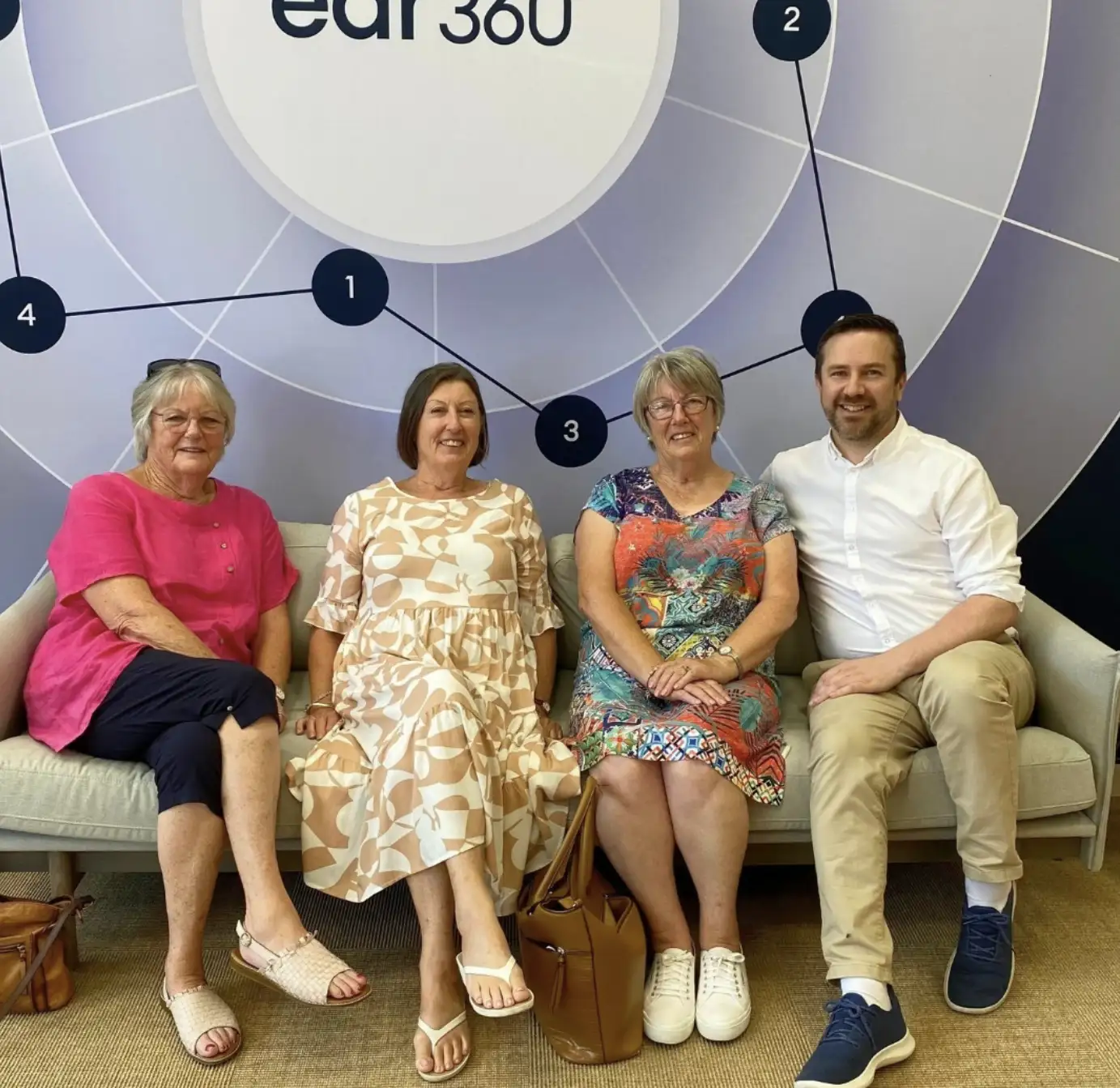- Hearing aids are small electronic devices designed for individuals with hearing loss.
- These devices can be worn in or around the ear and come in various sizes.
- The technology has four key components: a microphone, amplifier, receiver, and battery.
- With hearing aids, sounds are essentially converted into sharper, louder, more manageable audio, giving people greater confidence when engaging in conversations, meetings, phone calls, and other daily scenarios.
- Some hearing aids offer modern features, such as Bluetooth connectivity, to enhance the listening experience.
- Recent advancements in hearing aid technology have led to incredible capabilities, and there’s a solution for everyone!
- The ReSound Vivia™ 9 is Resonate Health’s current hearing aid of choice.
- Learn more in our Ultimate Guide to Hearing Aids, or feel free to get in touch for professional advice and hearing loss solutions.
Breaking it down: The basic parts of a hearing aid
Hearing aids are intricate devices composed of four core components: the microphone, amplifier, receiver, and battery. The microphone captures sounds, which are then enhanced by the amplifier before being transmitted to the ear via the receiver. Simultaneously, the battery keeps the device running smoothly.
These elements work harmoniously to improve auditory experiences, empowering individuals with hearing loss to better communicate and connect with the world around them.
Battery-operated vs. rechargeables
Historically, hearing aids have been battery-operated, requiring the regular replacement of disposable batteries. But today, we can avoid the waste with a more convenient, long-lasting option — rechargeables. While they gained traction in the mid-2010s, it’s only in recent years that they’ve become the more favoured option, praised for their ease of use, cost-effectiveness, and reduced waste.

How do hearing aids help people hear?
Hearing aids contain microphones that pick up sounds from our environments and convert them into signals that are adjusted to suit your hearing needs. What would have been low in volume or indistinguishable can become louder and crystal clear, making a significant difference in your daily life and greater well-being.
Do hearing aids amplify background noise?
Yes, hearing aids can amplify background noise. However, the more advanced devices are finely tuned for selective amplification, dialling down unwanted background noise while intensifying and clarifying desired sounds. With this quality of control, hearing aids can drastically improve your ability to hear and communicate with others.
Do hearing aids damage your ears?
Not when properly fitted and used as directed. In fact, studies indicate that hearing aids can actually help maintain the brain's cognitive functions by stimulating the hearing nerve and providing continuous auditory input to the brain. This consistent exercise can prevent the brain from losing its ability to process sound, which tends to happen if hearing loss is left untreated for a prolonged period. Learn more in our review of the link between hearing loss and dementia.
Exploring hearing aid options in New Zealand
Choosing the right hearing aid requires careful consideration of your hearing health, lifestyle, and preferences. We’re fortunate to have many solutions available in New Zealand, providing alternative features and styles to suit your unique needs. However, the wide variety of options can feel overwhelming when looking for the best hearing aid for you.
Understanding the different kinds of hearing aids
To get started, it helps to explore the basics. We’ve outlined the six main types of hearing aids to make this easier. And if you have any questions or want to discuss hearing loss solutions, feel free to get in touch via 0800 737 662 or enquire online — your local Resonate audiologists are here to help.

The latest features in hearing aid technology
Hearing aid technology has significantly improved in recent years, bringing about several exciting advancements. Some of the most noteworthy features include Bluetooth connectivity, noise reduction, feedback suppression, and directional microphones. These features have empowered people worldwide to connect, engage, and thrive in their personal and professional lives — which goes to show the importance of our hearing health.
Unsurprisingly, some hearing aids now come equipped with artificial intelligence (AI), allowing them to learn and adapt to the user's preferences over time. It’s advancements like these that can be game-changing, making hearing aids more effective and user-friendly than ever before.
- Noise Reduction: Enhances speech in noisy environments
- Directional Microphones: Pinpoints specific sounds for optimal clarity
- Rechargeable Batteries: A convenient, eco-friendly energy source
- Telecoils and Wireless Connectivity: Effortless pairing with compatible devices
- Remote Controls and Synchronisation: Seamless hearing aid adjustment
- Tinnitus Support: Alleviates buzzing or ringing discomfort
Meet the ReSound Nexia™ 9
The Nexia™ 9 is the newest hearing aid family from the Danish brand ReSound. This device includes many of the latest features in hearing aid technology, including improved directional microphones, Bluetooth audio streaming, and the highest rating for water, dust, and dirt protection.
At Resonate, we’re proud to partner with ReSound, offering one of the best products available on the market to people across New Zealand. You can learn more about the Nexia™ 9 and our affordable hearing aid subscription, Unlimited, here.
Looking for hearing aids online?
We appreciate that everyone’s journey to optimal hearing health is unique — there’s no one-size-fits-all. That's why, at Resonate, we offer personalised hearing care solutions with a holistic approach, taking into account how your ears affect your well-being.
Our Ear360 hearing assessment is a popular choice for those wanting to understand the bigger picture of their hearing health — providing a detailed hearing map that identifies any potential issues. And for those wanting to continue exploring options for new hearing aids, our experienced audiologists are here to help.
Enquire online for more information, or get in touch via 0800 737 662 to chat with our team today!
























